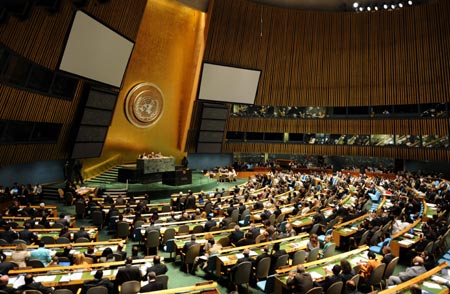An ongoing high-level debate at the UN General Assembly has reflected a growing consensus on an overhaul of the current global financial structure, which was founded more than 60 years ago.
Also, while taking the podium at the New York headquarters of the 192-member world body, top officials, in particular those from developing countries, are calling for the UN to play a key role in addressing the world financial and economic crisis.
 |
|
The United Nations Conference on the World Financial and Economic Crisis and Its Impact on Development is held at the UN headquarters in New York, the U.S., June 24, 2009. The United Nations kicked off a three-day high-level meeting on Wednesday to assess the worst global economic downturn since the Great Depression.[Gu Xinrong/Xinhua]?? |
The three-day conference, which opened on Wednesday, has brought together some 120 member states, the majority of which are developing countries, to discuss how the international community might be able to help poor countries tide over the crisis.
UN Secretary-general Ban Ki-moon called for a reform of international financial institutions, saying that bodies and mechanisms created generations ago must be made more accountable, more representative and more effective.??
Some delegates insisted that the Bretton Woods Institutions, which was created in 1944 and comprises the World Bank and the International Monetary Fund (IMF), should be reformed to be more development-oriented and more accessible to poor countries.
There was also a need for a new financial architecture, with stronger regulation and better monitoring mechanisms to prevent potential economic and financial threats from developing into major disasters, they said.
Ernesto Cordero Arroyo, minister of social development of Mexico, said that a reform of the international financial system was needed to make it more oriented toward development.
He called for decisively increasing developing countries' participation in international financial institutions, to make them more representative.
During the debate, the current practice of having the United States and the European Union name their candidates to lead the World Bank and the IMF was challenged.
The Mexican minister said that the heads of those institutions should be elected based on democratic criteria and based on their merits, without areographic or nationality conditions.
Belize's Prime Minister Dean Barrow urged "greater and more effective global participation" in the international financial institutions.
"Thus, the leadership of the institutions should be selected on the basis of open and fair competition from among nationals of members," Barrow said. "There can be no justification for continuing the current practice whereby the President of the World Bank Group is appointed by the US, and the Managing Director of the IMF is appointed by the European countries acting together."
Some delegates also called for greater voice and representation of developing countries, in particular low income countries, in the decision-making mechanisms of international financial institutions.
Steve William Abana, minister for national planning and aid coordination of the Solomon Islands, said that the international financial structure was significantly flawed, and that any reform must aim to give low income countries increased representation.
Greater UN role in tackling crisis
UN officials and developing countries argued that the United Nations, the only universal body that represents all sovereign states, must play a stronger role in the global response to the current crisis.
"We need the United Nations," Ban said, calling for a renewed multilateralism to help all countries weather the economic downturn.
"What better place than this United Nations General Assembly to do so," UNGA President D'Escoto Brockmann said, touting the assembly as the "headquarters of the G192".
Some participants of the conference said that the UN should have an active role in the new international financial architecture.
Tiliman Thomas, prime minister of Grenada, said that the global crisis required increases in financial resources, accompanied by a restructuring of international financial institutions, improved regulation and better governance.
Moreover, the UN had to embark on a more prominent role in those pursuits, Thomas said.
Thongloun Sisoulith, deputy prime minister of Laos, stressed that his government supported the role of the UN in developing an international consensus on what action must be taken to address the crisis.
The country "supports the role of the UN in developing a global consensus concerning actions that must be taken in finding sustainable solutions to the crisis," he said.
Barbados voiced its hope to see a greater role of the United Nations in global economic decision making.
"Barbados believes that the United Nations, which has a unique role and legitimacy, must play a much greater role in global economic decision making and rule setting," said Darcy Boyce, Barbados' minister of state of finance, investment, telecommunications and energy.
This is the first high-level conference in the history of the United Nations to discuss an international financial crisis.
The aim of the high-level gathering, officially known as "the United Nations Conference on the World Financial and Economic Crisis and Its Impact on Development," is to identify emergency and long-term responses to mitigate the impact of the crisis, especially on vulnerable populations, and initiate a needed dialogue on the transformation of the international financial architecture, taking into account the needs and concerns of all member states.
(Xinhua News Agency June 26, 2009)